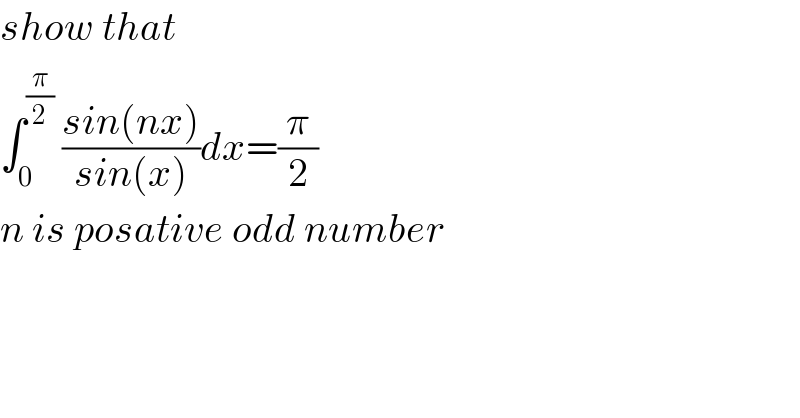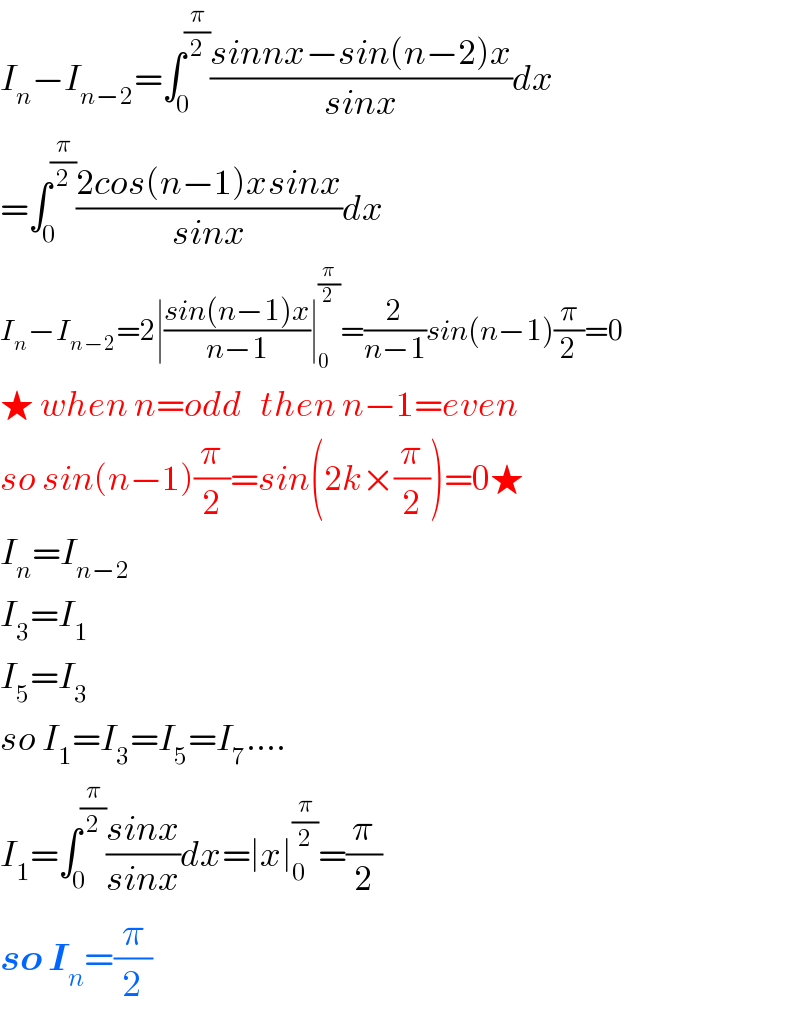
Question Number 83064 by M±th+et£s last updated on 27/Feb/20

$${show}\:{that} \\ $$$$\int_{\mathrm{0}} ^{\frac{\pi}{\mathrm{2}}} \:\frac{{sin}\left({nx}\right)}{{sin}\left({x}\right)}{dx}=\frac{\pi}{\mathrm{2}} \\ $$$${n}\:{is}\:{posative}\:{odd}\:{number} \\ $$
Answered by mind is power last updated on 27/Feb/20
![∫_0 ^(π/2) ((sin(2kx+x))/(sin(x)))=∫_0 ^(π/2) {((sin(2kx)cos(x))/(sin(x)))+cos(2kx)}dx k=0 evidente Σ_(k=0) ^(n −1) e^(ikx) =((1−(e^(inx) ))/(1−e^(ix) ))=((e^(i(((n−1)/2))x) sin((n/2)x))/(sin((x/2)))) ⇒Σ_(k=0) ^(n−1) e^(i2kx) =((e^(i(n−1)x) sin(nx))/(sin(x))) ⇒Σ_(k=0) ^(n−1) e^(i(2k−n+1)x) =((sin(nx))/(sin(x))) n=2m+1 ⇒∫_0 ^(π/2) Σ_(k=0) ^(2m) e^(i(2k−2m)x) dx=∫_0 ^(π/2) ((sin((2m+1)x))/(sin(x)))dx m>0⇒ ∫_0 ^(π/2) Σ_(k=0) ^(m−1) e^(i(2k−2m)x) dx+∫_0 ^(π/2) e^(i.(2m−2m)x) dx+∫_0 ^(π/2) Σ_(k=m+1) ^(2m) e^(i(2k−2m)x) dx =Σ_(k=0) ^(m−1) ∫_0 ^(π/2) e^(i(2k−2m)x) dx =Σ_(k=0) ^(m−1) [(e^(i(2k−2m)x) /(i(2k−2m)))]_0 ^(π/2) +∫_0 ^(π/2) dx+Σ_(m+1) ^(2m) [(e^(i(2k−2m)x) /(2k−2m))]_0 ^(π/2) =Σ_(k=0) ^(m−1) (((−1)^(k−m) −1)/(i2(k−m))) +(π/2)+Σ_(m+1) ^(2m) [(((−1)^(k−m) −1)/(i2(k−m)))] Σ_(m+1) ^(2m) [(((−1)^(k−m) −1)/(2i(k−m)))]=Σ_0 ^(m−1) [(((−1)^(2m−k−m) −1)/(2i(2m−k−m)))] =Σ_(k=0) ^(m−1) [(((−1)^(k−m) −1)/(2i(m−k)))]=−Σ_(k=0) ^(m−1) [(((−1)^(k−m) −1)/(2i(k−m)))] ⇒Σ_(m+1) ^(2m) [(((−1)^(k−m) −1)/(2i(k−m)))]+Σ_(k=0) ^(m−1) [(((−1)^(k−m) −1)/(2i(k−m)))]=0 ⇒Σ_(k=0) ^(m−1) ∫_0 ^(π/2) e^(i2(k−m)x) dx=(π/2)=∫_0 ^(π/2) ((sin(nx))/(sin(x)))dx](Q83069.png)
$$\int_{\mathrm{0}} ^{\frac{\pi}{\mathrm{2}}} \frac{{sin}\left(\mathrm{2}{kx}+{x}\right)}{{sin}\left({x}\right)}=\int_{\mathrm{0}} ^{\frac{\pi}{\mathrm{2}}} \left\{\frac{{sin}\left(\mathrm{2}{kx}\right){cos}\left({x}\right)}{{sin}\left({x}\right)}+{cos}\left(\mathrm{2}{kx}\right)\right\}{dx} \\ $$$${k}=\mathrm{0}\:\:{evidente} \\ $$$$\underset{{k}=\mathrm{0}} {\overset{{n}\:−\mathrm{1}} {\sum}}{e}^{{ikx}} =\frac{\mathrm{1}−\left({e}^{{inx}} \right)}{\mathrm{1}−{e}^{{ix}} }=\frac{{e}^{{i}\left(\frac{{n}−\mathrm{1}}{\mathrm{2}}\right){x}} {sin}\left(\frac{{n}}{\mathrm{2}}{x}\right)}{{sin}\left(\frac{{x}}{\mathrm{2}}\right)} \\ $$$$\Rightarrow\underset{{k}=\mathrm{0}} {\overset{{n}−\mathrm{1}} {\sum}}{e}^{{i}\mathrm{2}{kx}} =\frac{{e}^{{i}\left({n}−\mathrm{1}\right){x}} {sin}\left({nx}\right)}{{sin}\left({x}\right)} \\ $$$$\Rightarrow\underset{{k}=\mathrm{0}} {\overset{{n}−\mathrm{1}} {\sum}}{e}^{{i}\left(\mathrm{2}{k}−{n}+\mathrm{1}\right){x}} =\frac{{sin}\left({nx}\right)}{{sin}\left({x}\right)} \\ $$$${n}=\mathrm{2}{m}+\mathrm{1} \\ $$$$\Rightarrow\int_{\mathrm{0}} ^{\frac{\pi}{\mathrm{2}}} \underset{{k}=\mathrm{0}} {\overset{\mathrm{2}{m}} {\sum}}{e}^{{i}\left(\mathrm{2}{k}−\mathrm{2}{m}\right){x}} {dx}=\int_{\mathrm{0}} ^{\frac{\pi}{\mathrm{2}}} \frac{{sin}\left(\left(\mathrm{2}{m}+\mathrm{1}\right){x}\right)}{{sin}\left({x}\right)}{dx} \\ $$$${m}>\mathrm{0}\Rightarrow \\ $$$$\int_{\mathrm{0}} ^{\frac{\pi}{\mathrm{2}}} \underset{{k}=\mathrm{0}} {\overset{{m}−\mathrm{1}} {\sum}}{e}^{{i}\left(\mathrm{2}{k}−\mathrm{2}{m}\right){x}} {dx}+\int_{\mathrm{0}} ^{\frac{\pi}{\mathrm{2}}} {e}^{{i}.\left(\mathrm{2}{m}−\mathrm{2}{m}\right){x}} {dx}+\int_{\mathrm{0}} ^{\frac{\pi}{\mathrm{2}}} \underset{{k}={m}+\mathrm{1}} {\overset{\mathrm{2}{m}} {\sum}}{e}^{{i}\left(\mathrm{2}{k}−\mathrm{2}{m}\right){x}} {dx} \\ $$$$=\underset{{k}=\mathrm{0}} {\overset{{m}−\mathrm{1}} {\sum}}\int_{\mathrm{0}} ^{\frac{\pi}{\mathrm{2}}} {e}^{{i}\left(\mathrm{2}{k}−\mathrm{2}{m}\right){x}} {dx} \\ $$$$=\underset{{k}=\mathrm{0}} {\overset{{m}−\mathrm{1}} {\sum}}\left[\frac{{e}^{{i}\left(\mathrm{2}{k}−\mathrm{2}{m}\right){x}} }{{i}\left(\mathrm{2}{k}−\mathrm{2}{m}\right)}\right]_{\mathrm{0}} ^{\frac{\pi}{\mathrm{2}}} +\int_{\mathrm{0}} ^{\frac{\pi}{\mathrm{2}}} {dx}+\underset{{m}+\mathrm{1}} {\overset{\mathrm{2}{m}} {\sum}}\left[\frac{{e}^{{i}\left(\mathrm{2}{k}−\mathrm{2}{m}\right){x}} }{\mathrm{2}{k}−\mathrm{2}{m}}\right]_{\mathrm{0}} ^{\frac{\pi}{\mathrm{2}}} \\ $$$$=\underset{{k}=\mathrm{0}} {\overset{{m}−\mathrm{1}} {\sum}}\frac{\left(−\mathrm{1}\right)^{{k}−{m}} −\mathrm{1}}{{i}\mathrm{2}\left({k}−{m}\right)}\:\:\:+\frac{\pi}{\mathrm{2}}+\underset{{m}+\mathrm{1}} {\overset{\mathrm{2}{m}} {\sum}}\left[\frac{\left(−\mathrm{1}\right)^{{k}−{m}} −\mathrm{1}}{{i}\mathrm{2}\left({k}−{m}\right)}\right] \\ $$$$\underset{{m}+\mathrm{1}} {\overset{\mathrm{2}{m}} {\sum}}\left[\frac{\left(−\mathrm{1}\right)^{{k}−{m}} −\mathrm{1}}{\mathrm{2}{i}\left({k}−{m}\right)}\right]=\underset{\mathrm{0}} {\overset{{m}−\mathrm{1}} {\sum}}\left[\frac{\left(−\mathrm{1}\right)^{\mathrm{2}{m}−{k}−{m}} −\mathrm{1}}{\mathrm{2}{i}\left(\mathrm{2}{m}−{k}−{m}\right)}\right] \\ $$$$=\underset{{k}=\mathrm{0}} {\overset{{m}−\mathrm{1}} {\sum}}\left[\frac{\left(−\mathrm{1}\right)^{{k}−{m}} −\mathrm{1}}{\mathrm{2}{i}\left({m}−{k}\right)}\right]=−\underset{{k}=\mathrm{0}} {\overset{{m}−\mathrm{1}} {\sum}}\left[\frac{\left(−\mathrm{1}\right)^{{k}−{m}} −\mathrm{1}}{\mathrm{2}{i}\left({k}−{m}\right)}\right] \\ $$$$\Rightarrow\underset{{m}+\mathrm{1}} {\overset{\mathrm{2}{m}} {\sum}}\left[\frac{\left(−\mathrm{1}\right)^{{k}−{m}} −\mathrm{1}}{\mathrm{2}{i}\left({k}−{m}\right)}\right]+\underset{{k}=\mathrm{0}} {\overset{{m}−\mathrm{1}} {\sum}}\left[\frac{\left(−\mathrm{1}\right)^{{k}−{m}} −\mathrm{1}}{\mathrm{2}{i}\left({k}−{m}\right)}\right]=\mathrm{0} \\ $$$$\Rightarrow\underset{{k}=\mathrm{0}} {\overset{{m}−\mathrm{1}} {\sum}}\int_{\mathrm{0}} ^{\frac{\pi}{\mathrm{2}}} {e}^{{i}\mathrm{2}\left({k}−{m}\right){x}} {dx}=\frac{\pi}{\mathrm{2}}=\int_{\mathrm{0}} ^{\frac{\pi}{\mathrm{2}}} \frac{{sin}\left({nx}\right)}{{sin}\left({x}\right)}{dx} \\ $$$$ \\ $$
Commented by M±th+et£s last updated on 27/Feb/20

$${god}\:{bless}\:{you} \\ $$
Commented by mind is power last updated on 27/Feb/20

$${withe}\:{pleasur}\:{god}\:{bless}\:\:{evrey}\:{one}\: \\ $$$$ \\ $$
Answered by TANMAY PANACEA last updated on 28/Feb/20

$${I}_{{n}} −{I}_{{n}−\mathrm{2}} =\int_{\mathrm{0}} ^{\frac{\pi}{\mathrm{2}}} \frac{{sinnx}−{sin}\left({n}−\mathrm{2}\right){x}}{{sinx}}{dx} \\ $$$$=\int_{\mathrm{0}} ^{\frac{\pi}{\mathrm{2}}} \frac{\mathrm{2}{cos}\left({n}−\mathrm{1}\right){xsinx}}{{sinx}}{dx} \\ $$$${I}_{{n}} −{I}_{{n}−\mathrm{2}} =\mathrm{2}\mid\frac{{sin}\left({n}−\mathrm{1}\right){x}}{{n}−\mathrm{1}}\mid_{\mathrm{0}} ^{\frac{\pi}{\mathrm{2}}} =\frac{\mathrm{2}}{{n}−\mathrm{1}}{sin}\left({n}−\mathrm{1}\right)\frac{\pi}{\mathrm{2}}=\mathrm{0} \\ $$$$\bigstar\:{when}\:{n}={odd}\:\:\:{then}\:{n}−\mathrm{1}={even} \\ $$$${so}\:{sin}\left({n}−\mathrm{1}\right)\frac{\pi}{\mathrm{2}}={sin}\left(\mathrm{2}{k}×\frac{\pi}{\mathrm{2}}\right)=\mathrm{0}\bigstar \\ $$$${I}_{{n}} ={I}_{{n}−\mathrm{2}} \: \\ $$$${I}_{\mathrm{3}} ={I}_{\mathrm{1}} \\ $$$${I}_{\mathrm{5}} ={I}_{\mathrm{3}} \\ $$$${so}\:{I}_{\mathrm{1}} ={I}_{\mathrm{3}} ={I}_{\mathrm{5}} ={I}_{\mathrm{7}} .... \\ $$$${I}_{\mathrm{1}} =\int_{\mathrm{0}} ^{\frac{\pi}{\mathrm{2}}} \frac{{sinx}}{{sinx}}{dx}=\mid{x}\mid_{\mathrm{0}} ^{\frac{\pi}{\mathrm{2}}} =\frac{\pi}{\mathrm{2}} \\ $$$$\boldsymbol{{so}}\:\boldsymbol{{I}}_{{n}} =\frac{\pi}{\mathrm{2}} \\ $$
Commented by M±th+et£s last updated on 28/Feb/20

$${god}\:{bless}\:{you}\:{sir} \\ $$
Commented by TANMAY PANACEA last updated on 28/Feb/20

$${blessing}\:{shower}\:{to}\:{all} \\ $$
